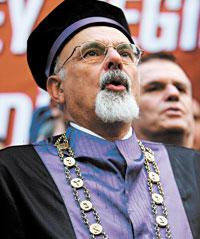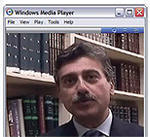Reuven Snir is a Haifa university professor of Arabic. A Communist, his writings demonstrate hostility typical of a small but vocal coterie of Arab-born radical writers in Israel towards both Zionism and Arab nationalism, and a desperate need to universalise their identity as 'Arab Jews'. Snir hankers for the 'Baghdad Spring', the great cultural dawning of the new multifaith Iraq in the 1920s, in which Jews expected to play a leading role. But as I tried to say in this article , cultural affinities with Muslims and Christians do not guarantee peaceful coexistence. They were not enough to save the Jews. Even the most acculturated Jew, like Snir's hero, the writer Anwar Shaul, found that Iraq had rejected him, and he too was forced to follow the rest of the Jewish community into exile. (With thanks: bh)The Baghdad Spring of 1920 was not as short as the Prague Spring, but unfortunately it fell short of providing a new point of departure for the people of the Middle East – in my view, one of the great missed opportunities in the history of this part of the world.
The aforementioned Anwar Shā'ul never declared during the 1920s 'I am an Arab Jew' because he had no reason to struggle for his identity: it was self-evident for him, as it was self-evident for many of his Iraqi compatriot poets. When the new state of Iraq was established the Jews had every reason to believe that the local society around them very much desired their full integration.
On 18th July 1921, before his coronation as King of Iraq, the Amir Faysal addressed Jewish community leaders: 'In the terminology of patriotism there is nothing called Jews, Muslims, and Christians. There is simply one thing called Iraq. [...] I ask all the Iraqi children of my homeland to be simply Iraqis. [...] There is no distinction between Muslim, Christian, and Jew.' Sāṭi' al-Ḥuṣrī, Director General of Education in Iraq from 1923 to 1927, argued at the time that 'every person who speaks Arabic is an Arab'.
The new Iraq was built as a new community that invited specific people to join, and the identity of those who decided to join was constructed less out of negativity or difference and more out of positive belonging. There is a necessary link between rhetoric and identity; after all, the question of 'the one and the many' is a problem not only for philosophy but also for rhetoric, which interests itself in the speaker's or writer's capacity to engage an audience, to have an effect on others.
The orator's task, says Kenneth Burke in
A Rhetoric of Motives (1950), is consciously to construct this sense of commonality, to create a community, by way of identification. The orator hails his audience into existence, pulling together a community of listeners, by prompting them to identify with a common desire. We saw an excellent illustration of that 'pulling together a community of listeners' in the last American election with Barack Obama, although in that case it was mainly the 'politics of resentment'.
If we refer to all those who joined the new Iraqi community of the 1920s and expressed their desire to take part in building it, we can understand the great change that occurred in the life of those young secular Jewish intellectuals and writers who would later be known as the major figures in Iraqi Jewish literature. This shift was decisive because it involved different singularities: each wanted to belong to the new community without the need to abandon other frames of belonging, whether religious, ethnic, professional etc.
The importance of the new abode, the new community, may be learned from the context of the emergence of the modern Arabic literature of Iraqi Jews, for which we have solid historical documentation.
At the beginning of 1924 the Christian Iraqi writer Yūsuf Rizq Allāh Ghunayma (1885-1950) published a book entitled
Nuzhat al-Mushtāq fī Ta'rīkh Yahūd al-'Irāq [
The Trip of the Man Filled with Longing into the History of the Jews of Iraq] (published by Matba'at al-Furāt in Baghdad).
While describing the social classes of the Jewish community and the occupations of the Jews, Ghunayma remarked that the Jews of Iraq pursued all occupations, 'but writers and owners of periodicals and newspapers could not be found among them [the Jews]. The reason for this is that the Jew wants to work at what might benefit him, and composing and writing in our midst does not find a market. So in this matter they follow the Latin proverb that says: "Living comes first, before philosophy".'
Only three months after the publication of Ghunayma's book, on 10th April 1924, the first issue of the Arabic journal
al-Miṣbāḥ (The Candlestick) came out. The owner, the editor and most of the writers were Jews. The aim of the journal was to be part of mainstream Arabic journalism and culture and to contribute to Iraqi Arab culture with no narrow Jewish agenda at all.
The publication of
al-Miṣbāḥ illustrated the great change in the intellectual life of the Jewish community, whose young, educated, secular members started to consider themselves part of the new Iraqi Arab nation and intelligentsia. If I use the language of Ghunayma, the Jews started to speak on 'philosophical matters', namely: on things that have relative autonomy from the economic, social, and political fields and that often exist in aesthetic forms, one of whose principal aims is pleasure.
From the outset, the secular Iraqi Jewish young intellectuals were inspired by a cultural vision whose most eloquent dictum was
al-dīn li-llāhi wa-l-watan li-l-jamī' ('Religion is for God, the Fatherland is for everyone').
That slogan, which was probably coined by the Copt intellectual Tawfīq Dūs in the Coptic congress in Asyut in 1911, is based on the Arabic translation of Mark 12:17: 'Render to Caesar the things that are Caesar's, and to God the things that are God's'; it was inspired by the slogan of the Lebanese-Syrian Christian intellectuals of the nineteenth century: 'Love of the Fatherland is part of the faith'.
It was also the slogan of
al-Jinān, the first pan-Arabic periodical, which was founded in Beirut at the beginning of 1870 by Butrus al-Bustānī (1819-1883) and was published until 1886; it was edited by his son Salīm al-Bustānī (1848-1884).
Al-Jinān emphasised throughout its issues the need to substitute religious solidarity with national solidarity.
Inspired by the aforementioned Christian intellectuals, the Iraqi Jews who adopted the slogan 'Religion is for God, the Fatherland is for everyone' were encouraged by Koranic verses fostering religious tolerance and cultural pluralism, such as:
lā ikrāha fī al-dīn ('There is no compulsion in religion' –
Al-Baqara 256) and
lakum dīnukum wa-lī dīnī ('You have your path and I have mine –
Al-Kāfirūn 6).
When the State of Iraq was created, the secular Iraqi-Jewish intelligentsia rallied as a matter of course behind the efforts to make Iraq a modern nation state for all its citizens – Sunni and Shia Muslims, Kurds and Turkmen, Assyrian and Armenian Christians, Yazidis and Jews alike. The vision and hopes of European Zionists at the time to establish a Jewish nation state in Palestine, as promised in 1917 by the Balfour Declaration, was for the Iraqi Jews a far-off cloud, something totally undesired.
Sir Arnold Talbot Wilson (1884-1940), the Acting Civil Commissioner in Mesopotamia (1918-1920), writes in his personal and historical record:
I discussed the declaration at the time with several members of the Jewish community, with whom we were on friendly terms. They remarked that Palestine was a poor country, and Jerusalem a bad town to live in. Compared with Palestine, Mesopotamia was a Paradise. 'This is the Garden of Eden,' said one; 'it is from this country that Adam was driven forth – give us a good government and we will make this country flourish – for us Mesopotamia is a home, a national home to which the Jews of Bombay and Persia and Turkey will be glad to come. Here shall be liberty and with it opportunity! In Palestine there may be liberty, but there will be no opportunity.' (Wilson 1936, I, 305-306)
In the late Thirties the Jewish educator Ezra Haddād declared that 'we are Arabs before we are Jews'. Ya'qūb Balbūl wrote that 'a Jewish youth in the Arab countries expects from Zionism nothing other than colonialism and domination'. Most of Iraq's Jewish population lived in Baghdad, filling most of the civil service jobs under the British and the early monarchy.
Nissim Rejwan says that, just as it has often been said that New York is a Jewish city, so 'one can safely say the same about Baghdad during the first half of the twentieth century'. The real national vision of the Iraqi Jews, at least the vision of the intellectual secular elite, was Iraqi and Arab – therefore, studies about the pre-1948 relationships between
Arabs and
Jews seem to use an anachronistic dichotomy which never existed in the Arab lands.
David Semah says: 'The Jews of Iraq never referred to non-Jewish Iraqis as "Arabs", but used the words "Muslim" and "Christian" [...]. When they spoke about "Arabs" (al-'Arab) they had in mind only Bedouins.'
If we return to
al-Minbar, the editor was Anwar Shā'ul, and he wrote under the pseudonym Ibn al-Samaw'al, an allusion to the pre-Islamic Jewish poet al-Samaw'al ibn 'Ādiyā', proverbial in Arab history for his loyalty. According to the ancient Arab cultural heritage, al-Samaw'al refused to deliver weapons that had been entrusted to him. Consequently, he witnessed the murder of his own son by the Bedouin chieftain who laid siege to his castle to carry off the weapons that had been left in his charge.
Al-Samaw'al is commemorated in Arab history by the saying
Awfā min al-Samaw'al ('more loyal than' or 'as faithful as al-Samaw'al'). The decision to use this pseudonym reflected Shā'ul's Iraqi-Arab vision, which he saw as most appropriate for the emergence of the Iraqi nation.
Anwar Shā'ul's poem 'al-Rabī'' ('Spring'), published in the first issue of
al-Miṣbāḥ, illustrated the hope for a new era of national unity far removed from any opportunistic considerations or religious fanaticism.
Read article in full














